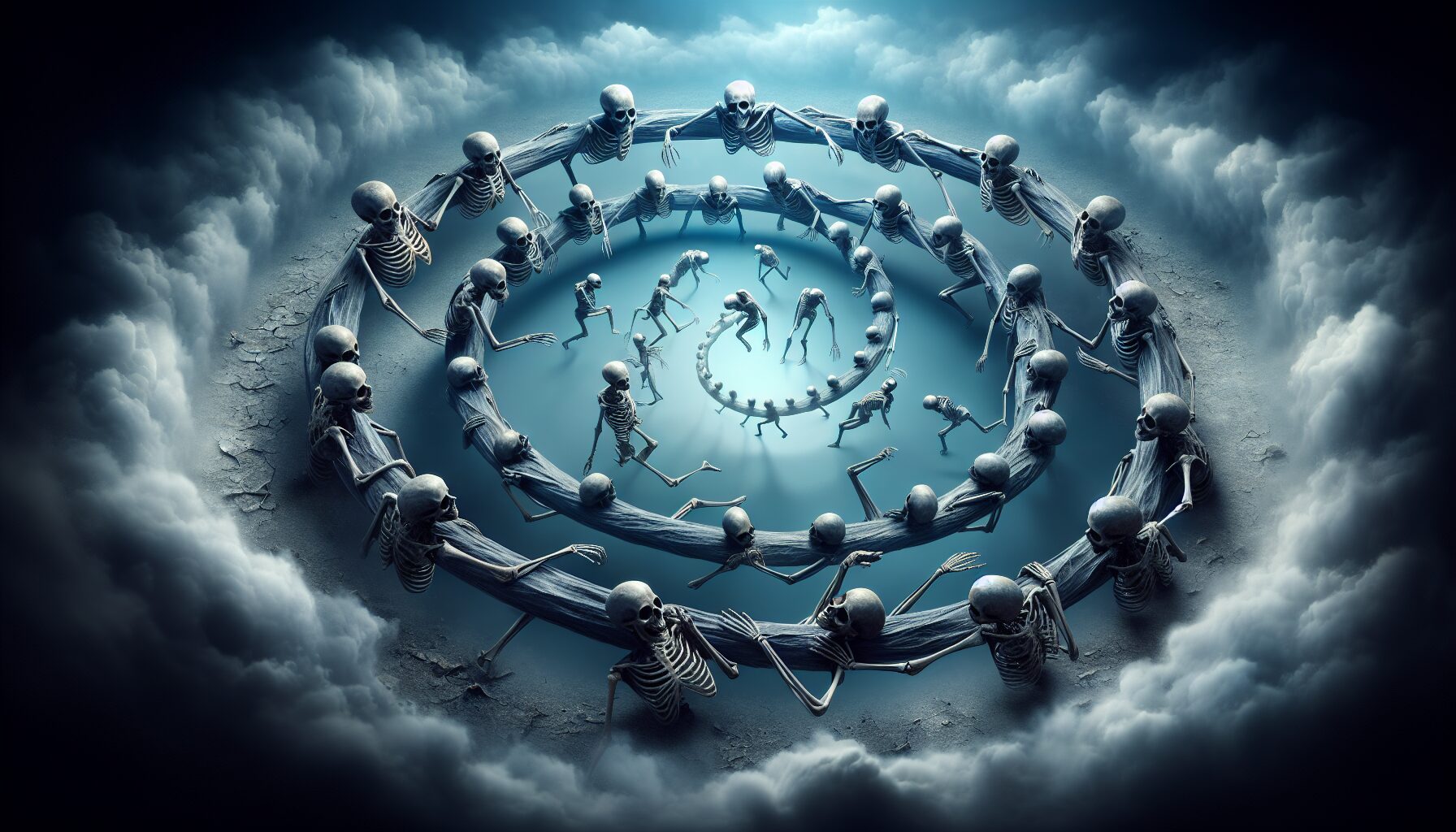In the vast tapestry of philosophical and spiritual beliefs that mankind has woven over millennia, few concepts are as enigmatic and thought-provoking as the idea of The Eternal Return. This notion posits that the universe and all existence within it are perpetually recurring, cycling through endless regenerations of birth, life, death, and rebirth. Found in diverse traditions and philosophies, from ancient Hindu texts to Nietzsche’s existential musings, the concept of The Eternal Return continues to provoke thought and spark debate.
The Roots of an Endless Cycle
The origins of the Eternal Return can be traced back to early civilizations, reflecting humanity’s quest to understand life and the cosmos. In Hindu cosmology, time is cyclical, comprising vast ages known as Yugas. Each cycle concludes with a dissolution (or Pralaya), only to begin anew.
- The Rigveda, an ancient Indian sacred collection of Vedic Sanskrit hymns, contemplates the universe as a great ‘cosmic egg’ that bursts open, creating the world anew repeatedly.
- Similarly, in Buddhism, the cycle of death and rebirth, known as Samsara, is governed by Karma, or the law of cause and effect.
According to Indian philosophy scholar Wendy Doniger, there is a strong emphasis on the eternal nature of this cycle, where one’s actions dictate the course of future rebirths until enlightenment is achieved, thereby breaking the cycle. In her book “The Implied Spider”, Doniger states:
“This cosmic rebirth is not merely a repetitious grind, but a process rife with the potential for transformative change.”
Western Interpretations and Nietzsche’s Vision
In Western philosophy, the Eternal Return gained prominence in the works of German philosopher Friedrich Nietzsche. Nietzsche’s eternal recurrence is more than a metaphysical or cosmological theory; it’s a profound existential proposition. In “The Gay Science”, Nietzsche wrote:
“What if some day or night a demon were to steal after you into your loneliest loneliness and say… this life as you now live it and have lived it, you will have to live once more and innumerable times more; and there will be nothing new in it.”
This idea challenges us to live as if each moment recurs eternally, encouraging a form of existential authenticity. For Nietzsche, embracing this return rather than resisting it moves one toward an existence full of meaning and purpose.
Scientific Echoes: Entropy and the Eternal Return
The concept of The Eternal Return isn’t only a philosophical and cultural construct; it draws interesting parallels from the realm of modern science. The law of entropy in thermodynamics denotes that systems tend to move toward a state of disorder. However, theoretical physics also contemplates the possibility of cyclical universes.
- Eternal recurrence hypotheses suggest that given an infinite amount of time, the universe’s finite particles might eventually repeat every possible configuration.
- Sir Roger Penrose, a noted mathematician, has postulated theories of “conformal cyclic cosmology,” suggesting an infinite sequence of aeons or universe cycles.
Though these scientific theories do not provide a consensus on cyclical cosmology, they illustrate our ongoing quest to understand the universe’s mysteries and, by extension, the nature of life and death within it.
Rebirth in Culture and Literature
The theme of an endless cycle of life and death has resonated deeply within literature and popular culture. Writers, artists, and filmmakers have all drawn upon this philosophical paradigm to explore themes of identity, fate, and redemption.
- The film “Groundhog Day” employs the concept of cyclical time as a narrative device, transforming a comedic premise into a poignant exploration of personal growth and self-discovery.
- In Gabriel Garcia Marquez’s “One Hundred Years of Solitude”, the cyclical patterns of the Buendía family’s history illustrate the inescapable repetition of both triumphs and tragedies, mirroring broader existential patterns.
Sartre once marveled at the possibility, saying:
“If… you had to repeat your life ad infinitum, would you grasp the value of choice? Each decision, magnified, contains the weight of a moral universe.”
Modern Reflections and Tomorrow’s Thoughts
The Eternal Return continues to provide a rich field for contemplation, challenging us to confront our own beliefs about time, existence, and the afterlife. For some, the cyclical view spurs a reevaluation of ethical living under the constant shadow of recurrence. For others, it offers solace, suggesting continuity beyond the veil of death.
As science advances and our understanding of the universe evolves, this ancient idea persists, urging us to see life not as a linear journey with a fixed endpoint, but as an ever-turning spiral that offers endless horizons of growth and rebirth. Perhaps, as we traverse the cosmic dance of time, we, too, echo the philosopher’s musing: is it in the knowing of the cycle that we find liberation?
Whether seen through the kaleidoscope of philosophy, the lens of science, or the storytelling of culture, The Eternal Return invites us to ponder deeply on existence’s mysteries, posing enduring questions that challenge and inspire the human soul.
For those who find resonance in this concept, life becomes a series of opportunities to embrace, explore, and resonate profoundly with the eternal song of the universe.

Comments